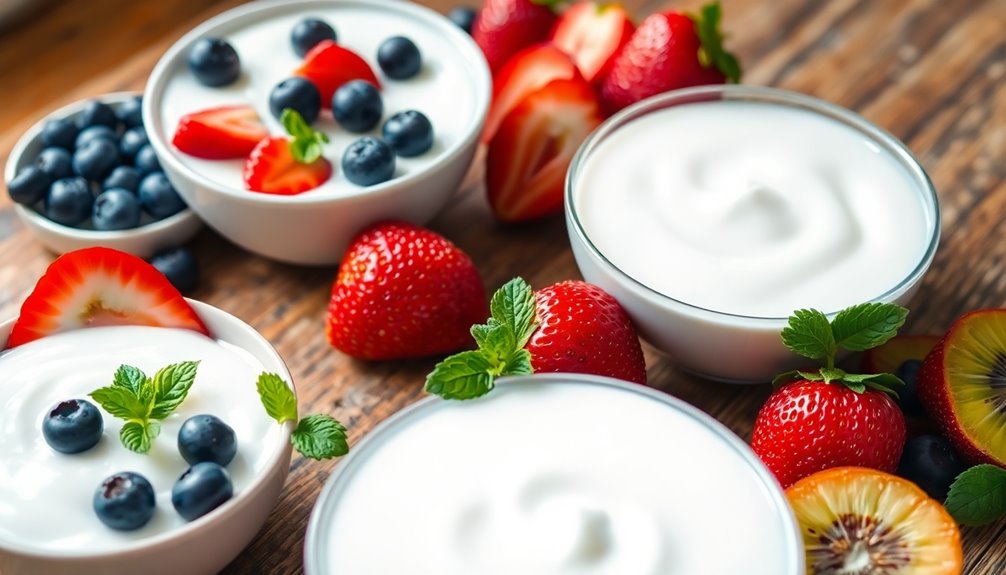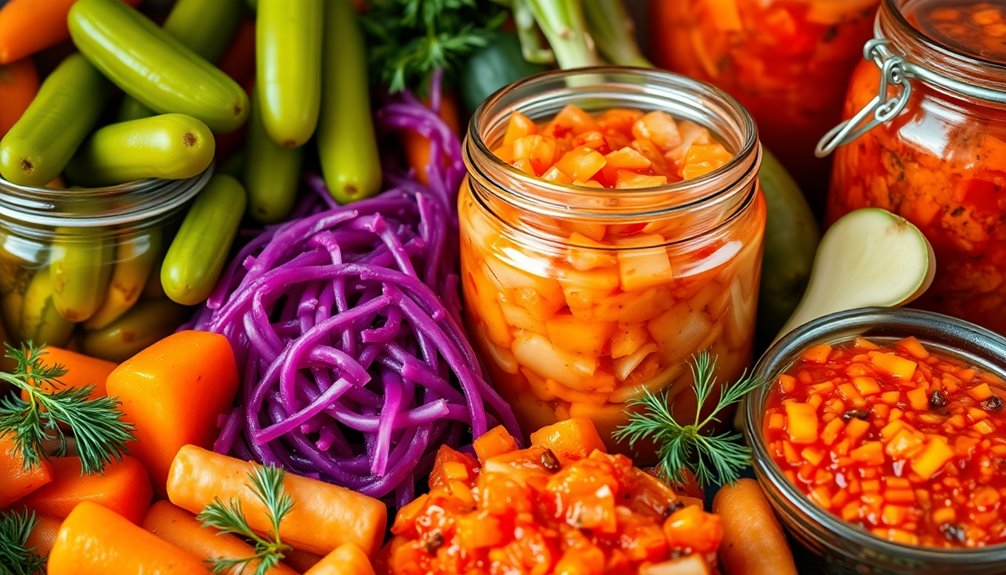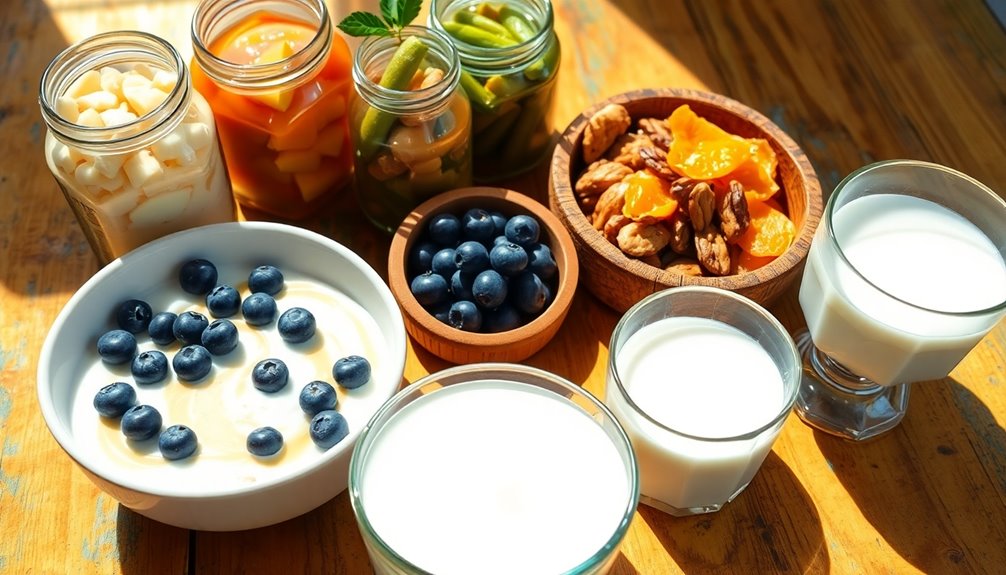Probiotic-rich foods play an essential role in improving your digestion and gut health. Incorporate yogurt and kefir, as they contain beneficial bacteria like Lactobacillus and Bifidobacterium. Fermented vegetables such as sauerkraut and kimchi also pack a punch with live cultures that promote gut balance. Don't overlook kombucha, a tasty, fizzy drink offering various flavors while enhancing your digestive system. Adding these foods to your diet can alleviate bloating, constipation, and other digestive issues, bolstering your immune system too. For more insights on how to seamlessly include these options into your meals, there's plenty more to explore.
Key Takeaways
- Yogurt, containing Lactobacillus and Bifidobacterium, supports gut health and improves digestion.
- Kefir, a fermented milk drink, offers a diverse range of probiotics that enhance digestive function.
- Fermented vegetables like sauerkraut and kimchi introduce beneficial bacteria that promote a healthy gut microbiome.
- Kombucha provides probiotics and serves as a healthier alternative to sugary beverages, aiding digestive health.
- Incorporating these probiotic-rich foods into your diet can significantly improve digestion and overall gut wellness.
Benefits of Probiotics

Probiotics offer numerous benefits for your digestive health, and incorporating them into your diet can make a significant difference. These live microorganisms, often referred to as "good bacteria," play a critical role in maintaining gut health. When you include probiotic-rich foods in your meals, you're actively supporting the balance of your gut microbiota, which is essential for proper digestion.
A healthy gut can help alleviate issues like bloating, constipation, and diarrhea, letting you feel more comfortable in your daily life.
Moreover, probiotics aren't just about your digestive comfort. They also contribute to a well-functioning immune system. A significant portion of your immune cells resides in your gut, and maintaining a healthy gut flora can enhance your body's defenses against illnesses. Research shows that individuals with a balanced gut microbiome tend to have stronger immune responses, which means you're less likely to get sick.
When you embrace probiotics, you're not just taking a step towards better gut health; you're also fostering a community of wellness within your body. Whether through supplements or probiotic-rich foods, you're making a choice that resonates with your desire to feel good and belong to a healthier lifestyle.
Yogurt and Kefir

When it comes to probiotic-rich foods, yogurt and kefir stand out as excellent choices for improving digestion and overall gut health. Both of these fermented dairy products are packed with beneficial bacteria that can support a healthy digestive system. Incorporating them into your diet can lead to numerous health benefits, including enhanced nutrient absorption and reduced bloating. Additionally, including whole-food sources of protein in your diet can further enhance your digestive wellness.
Here's a quick comparison of yogurt and kefir to help you decide which might be best for you:
| Feature | Yogurt |
|---|---|
| Probiotics | Contains Lactobacillus and Bifidobacterium |
| Texture | Creamy and thick |
| Fermentation | Typically fermented for 4-6 hours |
| Feature | Kefir |
| Probiotics | Contains a wider variety of bacteria and yeast |
| Texture | Thinner, more drinkable |
| Fermentation | Fermented for 12-24 hours |
Both yogurt and kefir can be great allies in your journey toward better gut health. They not only help balance your gut microbiome but also offer a delicious way to enjoy probiotics. Whether you prefer the creaminess of yogurt or the tangy refreshment of kefir, adding these foods to your meals or snacks can notably enhance your digestive wellness. So go ahead, indulge in these probiotic-rich foods and reap the benefits for your gut!
Fermented Vegetables

In addition to yogurt and kefir, fermented vegetables offer another fantastic source of probiotics that can enhance your digestive health. These vibrant foods, like sauerkraut, kimchi, and pickles, aren't just delicious; they're also packed with beneficial bacteria that support gut health.
The fermentation process breaks down the sugars in vegetables, transforming them into probiotics, which can help balance the gut microbiome. When you consume fermented vegetables, you're introducing live cultures into your digestive system. These cultures can aid in the breakdown of food, making nutrients more accessible for absorption.
Studies suggest that a healthy gut microbiome can improve digestion, boost your immune system, and even enhance your mood. You'll find that integrating fermented vegetables into your diet is simple and rewarding. Additionally, a plant-based diet can further support gut health by providing a variety of nutrient-rich foods.
You can enjoy them as a side dish, add them to salads, or include them in sandwiches. Not only do they add flavor, but they also pack a probiotic punch. If you're looking to improve your gut health, consider incorporating these foods regularly.
Kombucha and Other Drinks

Kombucha and other fermented beverages are valuable additions to your diet, providing a revitalizing source of probiotics that can promote digestive health. These drinks not only offer beneficial bacteria but also present a invigorating alternative to sugary sodas and juices. When you add kombucha to your daily regimen, you're not just relishing a flavorful beverage; you're also gaining various health advantages. Studies indicate that the probiotics in kombucha can improve gut flora, assist in digestion, and even enhance your immune system. Additionally, maintaining a healthy balance of gut bacteria is crucial for overall well-being and can support the management of chronic conditions like CKD.
There's a plethora of flavor varieties to discover. Whether you fancy traditional black tea kombucha or bold combinations with fruits, herbs, and spices, there's something for every taste. Many brands infuse their kombucha with ingredients like ginger, hibiscus, or berries, crafting distinctive taste experiences that keep your taste buds interested.
You can also explore other fermented beverages like kefir or water kefir, each offering its own array of flavors and health benefits.
When selecting a kombucha or fermented beverage, seek out brands that use premium ingredients and strike a good balance of sweetness and acidity. It's crucial to peruse labels to make certain you're receiving the probiotics you require without excessive sugar. While you sip on these delectable beverages, you'll not only relish their vibrant flavors but also sense a feeling of camaraderie with others who value the path to improved digestive health. Embrace the diversity and advantages that kombucha and other fermented beverages bring to your wellness regimen!
Other Probiotic Sources

Probiotics are found in a variety of foods beyond just kombucha, making it easy to incorporate them into your diet. If you're looking to enhance your gut health, consider adding these probiotic-rich options. They can be just as effective as probiotic supplements in promoting a balanced microbiome.
Here are some excellent sources of probiotics to include in your meals:
- Yogurt: Choose varieties with live active cultures for the best benefits.
- Kefir: This fermented milk drink is packed with probiotics and can be enjoyed on its own or in smoothies.
- Sauerkraut: Fermented cabbage not only adds flavor but also delivers a healthy dose of gut-friendly bacteria.
- Kimchi: This spicy Korean dish is rich in probiotics and can spice up any meal.
Incorporating these foods into your diet not only improves your gut health but also makes your meals more enjoyable. You might find that these options offer more than just probiotics; they add unique flavors and textures to your dishes. Additionally, a plant-based diet can further enhance your digestive health by increasing fiber intake and minimizing toxins.
Frequently Asked Questions
How Do Probiotics Affect Mental Health and Mood?
Probiotics play a significant role in your mental health through the gut-brain connection. When you maintain a healthy gut microbiome, it can positively influence your emotional well-being.
Research shows that probiotics may help reduce anxiety and depression by regulating neurotransmitters and inflammation.
Can I Take Probiotics With Antibiotics?
Can you really take probiotics with antibiotics? Yes, you can! While antibiotics may disrupt your gut flora, probiotics can help restore balance.
It's especially important during pregnancy since a healthy gut supports immunity for both you and your baby. Just make sure to space them out—taking probiotics a few hours after your antibiotics maximizes their effectiveness.
Are There Side Effects of Consuming Too Many Probiotics?
Yes, consuming too many probiotics can lead to probiotic overconsumption, which might disrupt your gut bacteria balance.
While probiotics are beneficial, excessive intake can cause side effects such as bloating, gas, or digestive discomfort.
It's crucial to listen to your body and maintain moderation. If you notice any adverse reactions, consider adjusting your intake or consulting a healthcare professional to ensure your gut health remains at its best without overdoing it.
How Long Does It Take to Notice Benefits From Probiotics?
Did you know that about 70% of people notice benefits from probiotics within two to three weeks?
The time it takes to feel improvements often depends on the probiotic dosages and the specific probiotic strains you're taking. Some strains work faster than others, so selecting carefully is crucial.
Is It Safe for Children to Consume Probiotic-Rich Foods?
Yes, it's generally safe for children to consume probiotic-rich foods, as they can positively influence the microbiome of children. Probiotics for kids can support gut health and enhance their immune system.
However, introducing these foods gradually and seeking advice from a pediatrician, particularly if your child has underlying health concerns, is crucial. This way, you can help them experience the advantages while maintaining their safety and well-being.
Conclusion
Incorporating probiotic-rich foods into your diet can greatly enhance your digestion and overall gut health. From creamy yogurt to zesty fermented vegetables, these culinary delights not only nourish your body but also foster a thriving microbiome. Just as the ancient Romans understood the value of fermented foods, you too can reap the benefits by embracing these options. So go ahead, elevate your meals with probiotics, and witness the positive changes in your digestive well-being.



